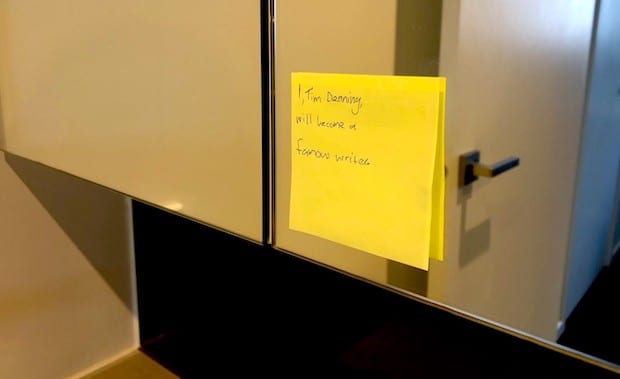Success Advice
A Tim Ferriss Like Japan Trip Rebuilt Me – Here’s Why

“Art imitates life so you must experience life to create art” – Unknown (possibly Tim Ferriss)
This quote is the reason why I recently took a holiday to Japan and why from now on I will travel more. All of us have a dream, a vision, a goal, a business which is another word for our own “art.”
Anything worth doing has an element of creativity attached to it which in essence is art. While on the way to Japan listening to the Tim Ferriss podcast, I heard this quote above. I realized that my life’s work had fizzled out somewhat because I needed to experience life more.
This whole blogging thing only works when I experience life – travel is the best way to do that. Second to that, I have been listening to Tim Ferriss’s podcast for years, and he talks a lot about Japan and how the culture can really positively impact your life.
Hearing this advice second hand just wasn’t good enough for me. That’s why, in Timmy style, I booked an unplanned trip to Japan with only two days notice. It was what I called a Tim Ferriss like trip to Japan. I wanted to transcend my current circumstances and boy did I do that!
Things before Japan had become a bit stale. I wasn’t quite me and I needed rebuilding again. It was time to self-disrupt and grow more as a person. I’d stopped growing and that’s why I felt off. Japan changed all of that.
Here’s how this Japan trip rebuilt me:
We’re all the same: we’re all loved.
Sitting at the airport in Australia I saw everyone saying goodbye to their loved ones. I did the same and said goodbye to my family and girlfriend. I sat there for around ten minutes and realized that we’re all loved by someone.
We all have someone who would be sad or miss us if we didn’t return home. All of us want to come home safe and see our loved ones again. While tragedy can strike, these trips to places like Japan are a must – they’re part of our journey in life.
These journeys we take are how we find ourselves. Without travel, we become lost and can’t understand how we fit into this world.
Knowing I’m loved and knowing the importance of these journeys helped rebuild me.
Japan can show you what is wrong too.
So far I’ve made Japan sound like it’s all roses – it’s not. I saw people working ridiculous hours. I saw Japanese people who had become obsessed with meaningless westernized brands. I saw women who still appeared to be second class compared with men.
Japan didn’t show me perfection; it showed me reality and that means that there are always going to be things that need to change. Each of us can form part of that change.
Objectification of women has changed men in a bad way.
For some reason, Japan gave me immense clarity. I noticed that me (and all other men) have become hardwired to look at women’s bodies. Even the nicest most loyal men who treat women well have been affected. I noticed this unconscious behavior in myself while in Australia and began questioning it.
Do we need to look at women in such a physical way? Is it really necessary? Is this addiction taking up so much of our creative genius and potential?
The answer to all of these questions, after Japan, was that a problem exists and this addiction is not serving as well. I’m not proud of this fact and I for one plan on not only being aware of it but also changing it. This idea helped rebuild me.
The Samurai showed the benefits of discipline.
While being an Aussie tourist walking through the grounds of the Imperial Palace, I saw some of the emperors Samurai training. The facility was surrounded by fences but being a tall guy, I could still see over the fence.
I found these Samurai to be cool because they were laser-focused on what they were doing. The Samurai had purpose and precision accuracy. Their discipline taught them patience and you could see the courage in their actions. Everything was thought through and nothing was left to chance.
The Samurai helped me rebuild my life by reminding me of what discipline can do when we embrace it. A disorganized mind combined with actions that are all over the place results in a lot of nothingness. Start with being a master at one thing instead of trying to be mediocre at lots of things.
Concrete Jungle vs. Nature
Before Japan, I was obsessed with visiting places like San Fran and New York to see big concrete cities and skyscrapers. Now that I’ve been to Japan I’ve realized that I’m completely bored of that. Going to My Fuji and some of the mountains in Kyoto is far more impactful.
Concrete jungles are all the same once you’ve seen a few. They all have lots of box’s – some tall, some wide, some full of lights and some full of views. When you see enough of these, you no longer become impressed by them.
Nature is impossible to top though. No matter how many lakes, mountains, beaches or forests I visit, I never get sick of them. That’s because it’s in our human DNA to feel a connection with nature. Nature is a place we can relax and recharge the batteries.
Japan taught me that for the rest of my travel adventures I am going to focus on beautiful places that encompass nature instead of man-made structures and fake tourist attractions like theme parks. Knowing what nature means to me has helped me to rebuild myself.
See as many places as you can.
This trip to Japan made me see that I get bored after around five days in one country. I’ve discovered that it’s ideal to see as many places as you can. The more of this Earth you experience, the more your life changes.
Don’t forget attention to detail.
Japanese people, I learned, are obsessed with attention to detail. Everything from the signage at train stations to the way they present food has been thought of.
“It’s not about being perfect; it’s about being purposeful”
It’s the little things that the Japanese people do that make you fall in love with them by the end of your stay in their country.
Manners feel good.
I quickly saw that Japanese people are very kind and have amazing manners. They say thank you so many times. As you walk out of a restaurant, the whole team say thank you like a giant choir. Being grateful and acknowledging each other is at the heart of their culture.
You can’t help but smile when you witness this way of treating one another. Not every stranger you meet in a foreign country is trying to commit a terrorist attack.
All I can say is manners just feel good and it put’s you in a positive mood. Plus, you walk around with a big fat smile on your face and that feels refreshing.
Connection through transport.
Japanese culture feels very connected and that’s partly to do with their very efficient transport system. There’s a subway station on practically every corner that’s affordable. Trains run every few minutes, so there’s never any need to run to the subway station to catch a train.
The bullet trains allow you to skip between states or regions in a very short amount of time. No need to board a plane or go through the razzle-dazzle of airport bureaucracy gone mad (thanks to perceived terrorism and the news).
While sitting on the Shinkansen (bullet train) to Kyoto, I saw families that were on their way to visit one another. They looked so relaxed and sat there enjoying the countryside of Japan as I did. It was a regular occurrence made possible by a fantastic transport system that is orderly and well thought out.
Technology is exhausting.
The negative side of technology is prominent in Japan. There are cities that are littered with giant LED screens, bright lights and technology on every corner. In these places, I felt unable to think clearly and the bright lights made me feel like I suffered from Attention Deficit Disorder.
There was technology within the toilet seat, on the plane, at restaurants and ugly vending machines selling fat causing sugar water on every corner.
On the flip side, what I loved about Japan was that talking loudly on a not so smart phone was prohibited in most places and there were locations where phones were non-existent. Japanese people seem to know how to balance life between being “ON” and being “OFF” when it comes to their phone.
“Instead of wasting your life away on your phone, Japan teaches you to become present and appreciate the here and now”
You notice things that you normally wouldn’t where I’m from in the Western World. With so much empty space, Japan is a great place to rebuild yourself. The rebuilding process needs thinking time away from phones.
Minimalism and being space conscious is beautiful.
The Japanese people are obsessed with being space conscious. They have double-decker car spaces, cube-shaped cars, cars made for people who must be three-foot tall, hotel rooms where you can barely open the door and space-saving retail shops like you’ve never seen.
Time is money in Japan.
My plane was on time to the second. Every train was on time. The tour guide at Mt Fuji was on time. The hotel cleaning was to the minute and so was the checkout. Time is money and it’s one resource we should take more seriously. Time gives you the opportunity to rebuild and grow.
Low energy states can be healed by travel.
More than a year since my last break, my energy levels in my career were at an all-time low. I had headaches every day and felt uninspired to a degree. It turns out all I needed was a holiday to rebuild.
Your body guides you.
Your heart guides you.
Your mind guides you.
This Japan trip taught me to take time to relax and recharge. Don’t ignore your body ever!
Climbing Japanese mountains is a metaphor for life.
I climbed this mountain in Kyoto. Halfway up I wanted to quit. I thought to myself “I’ve seen enough. Why go to the summit?”
That’s the problem right there. When we’re working on our goals, we give up too soon. We settle for okay instead of amazing. If this mountain were your life, would you give up when it got a bit hard? I’m telling you not to.
All the growth and everything you ever wanted comes from pushing that extra 2% to reach the top of the mountain. The feeling at the top is indescribable. Only those who are prepared to go the extra mile will know what it feels like to look down from the top.
Two more things to remember:
1. Once you reach the top, there’s always another mountain.
2. You must also help someone else climb the mountain to reach your full potential. Living is giving.
This mountain I climbed in Japan taught me so much about rebuilding my life (and yes I love mountain analogies).
There’s no place like a hot spring to contemplate life and rebuild your life.
While lying in a hot spring (Onsen) in Northern Tokyo, I sat there and thought I was going to be enjoying a relaxing time in a hot spring. What no one told me is that my entire life would replay before me. The onsen became a place to contemplate everything that had transpired thus far.
The hot water from the springs has a certain effect on your mind. I often find that my best thinking and ideas come from a shower and I’ve heard other people talk about this same experience.
“The hot spring sent my mind into deep thinking that I’ll never forget”
To enter a Japanese hot spring, you must be fully naked. You can’t bring clothes, material possessions, technology or a corporate mask. There’s nowhere to hide and no phone to look at. You sit there naked and bare your soul. It’s the one time where people can see you for exactly who you are.
Before contemplating my own life, I observed the men around me. Many of them seemed to be contemplating their life. Some looked tired and worn out from years of slaving away and doing hard labor.
Many of them looked like they were wasting away from years of working too hard and not remembering what truly matters. It was as if they had finally discovered what matters but that it was now too late. Then I saw the exact opposite – young men who had their whole lives ahead of them.
They too would sit there and weigh up their options. Should they follow their dream or fall for the Western myth that is collecting useless objects of little value? There were times where I wanted to answer this question for them.
I realized after a lot of thought that these young men had to come to that realization themselves. When you discover these truths of life yourself, everything changes and the principles stick.
I saw these young men by the end of my time in the hot spring for who they were and what they could become (their potential). I finally understood that they too could change the world in some impactful way if they chose too. We all have that choice and it’s ours to make.
“This stark comparison between the older men and the younger men was one of the most profound lessons of my Japan trip”
Both generations of men also looked up at the sky while doing this deep thinking. I found that quite bizarre and all of them did it.
What’s strange is that I also looked up at the sky without consciously being aware. Once I’d finished observing the men in the hot spring, I turned my thinking over to my own life. I had truth bomb after truth bomb as I sat there. I found myself running to the change room every 30 minutes to write stuff down.
What I had achieved so far and what I needed to do next became so clear. I sat in the hot spring proud of who I’ve become. For the first time in my life, I got to sit there and appreciate everything I’d put out into the world. I hadn’t stopped to see how far I’d come before this moment.
I was so focused on the present and trying to gain future success that I didn’t even know how proud I could be of myself. This fact has become the foundation of me going through the rebuilding phase yet again after five years since my last major self-renovation.
In summary….
Everyone reading this blog post has the opportunity to rebuild their life and consistently self-disrupt themselves. Going to places like Japan gives you the opportunity to experience life and see how far you’ve come. You can’t be ON 24/7 like those picture quotes tell you to be.
Once in a while, you need to be proud of who you are and think about who you can become.
Japan is a perfect place to do this and rebuild your life. Stay true to yourself and inspire others.
If you want to increase your productivity and learn some more valuable life hacks, then join my private mailing list on timdenning.net
Business
The Simple Security Stack Every Online Business Needs
Most small businesses are exposed online without realising it. This simple protection stack keeps costs low and risks lower.

Running a business online brings speed and reach, but it also brings risk. Data moves fast. Payments travel across borders. Teams log in from homes, cafés, and airports. (more…)
Business
If Your Business Internet Keeps Letting You Down, Read This
From smoother operations to better security, dedicated internet access is quietly powering today’s high-performing businesses.

Today, a dependable internet service is the bedrock for uninterrupted business operations. Many organizations rely on stable online connections for communication, data transfer, and customer interaction. (more…)
Did You Know
How Skilled Migrants Are Building Successful Careers After Moving Countries
Behind every successful skilled migrant career is a mix of resilience, strategy, and navigating systems built for locals.

Moving to a new country for work is exciting, but it can also be unnerving. Skilled migrants leave behind familiar systems, networks, and support to pursue better job opportunities and a better future for their families. (more…)
-

 News2 weeks ago
News2 weeks agoBrandon Willington Builds 7-Figure Business by Ignoring Almost Everything
-

 Health & Fitness3 weeks ago
Health & Fitness3 weeks agoWhat Minimalism Actually Means for Your Wellness Choices
-

 Did You Know3 weeks ago
Did You Know3 weeks agoWhy Most Online Courses Fail and How to Fix Them
-

 Business3 weeks ago
Business3 weeks agoIf Your Business Internet Keeps Letting You Down, Read This
-

 Business1 week ago
Business1 week agoEntrepreneur’s Guide to Pay Stubs: Why Freelancers and Small Business Owners Need a Smart Generator
-

 Business5 days ago
Business5 days agoThe Salary Shift Giving UK Employers An Unexpected Edge
-

 Business7 days ago
Business7 days agoThe Simple Security Stack Every Online Business Needs
-

 Scale Your Business6 days ago
Scale Your Business6 days ago5 Real Ways to Grow Your User Base Fast





















